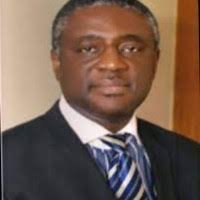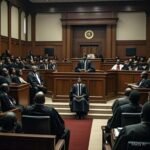The legal career of Joseph Chu’ma Otteh, whose mortal remains were committed to earth on 20 June 2025, could easily have been different. He graduated from the Faculty of Law at the Obafemi Awolowo University (OAU) in Ile-Ife in 1988, very much one of the best students in the set. In 1989, Joe enrolled as a lawyer in Nigeria. He had every opportunity to deploy his prodigious talents and considerable skills in the pursuit of personal fortune and no one could have begrudged him. Instead, he chose the path of legacy and impact through the pursuit of an unpredictable career in the defence of the excluded and marginalised.
As a lawyer, Joe worried about two intractable and inter-related problems: delay in justice delivery and judicial performance. His intellect and temperament were well suited to high judicial service. For someone who did not seek nor pursue a judicial career, however, his preoccupations were startling because ultimate control over the solutions to these issues lay in the hands of the judges, or so it was thought.
Early in his legal career, Joe chose to do something about these issues and he travelled around the world to prepare himself for that purpose, learning about models fit for adaptation in Nigeria. In pursuit of answers, he undertook two programmes of graduate studies in law, one at the University of Lagos in Nigeria and another at the New York University (NYU) in the United States of America. In between both programmes, in 1994, he also researched the same issue as a Research Fellow at the Danish Centre for Human Rights in Copenhagen, Denmark.
Three years earlier, in 1991, just fresh from completing his National Youth Service scheme, Joe had joined the staff of the Civil Liberties Organisation (CLO). There, he began his career as a lawyer to the under-privileged and under-represented in Nigeria whose encounters with justice were defined by the twin blights of exclusion and delay. For these people, entry into the court system was sometimes attainable but exit from it was almost always intractable.
For context, this problem probably predated Frederick Lugard’s Amalgamation of 1914.
In a memorandum to Frederick Lugard dated 11 February 1914, Edward Speed, the first Chief Justice of post-Amalgamation Nigeria, lamented that “the greatest enemy to the efficient administration of Criminal Law is delay.” It was to the redress of this century-old problem that Joe dedicated his professional life.
Joe realised he could not do this alone. So, in 1999, he founded Access to Justice as an organisation dedicated entirely to figuring out how to contribute to alleviating the twin problems of judicial (lack of) performance and delay in the legal process in Nigeria. The few lawyers who had adverted to this before him seemed to believe that the way to redress delay in litigation was to litigate more cases. They would file cases on behalf of specific victims of delay believing somehow that they could jump the queue of institutional dysfunction by inflicting more dysfunction on it.
Joe’s genius lay in his capacity for patient diagnosis. He saw this as a problem of judicial administration and court management. The answer, he believed, lay in working with the judges to re-design case management and judicial throughput. To address this, Joe invested patiently in cultivating the attentions of the Chief Justice of Nigeria (CJN) at the time, Mohammed Lawal Uwais, who died earlier this month. He was successful in persuading then Chief Justice Uwais to grant consent for a pilot project in monitoring the performance of judges.
Over a period of one year, monitors would record the way the judges ran their courts, documenting such minutiae as when they began sitting; how long they did; the number of motions, trials, cases that they did and the number of rulings, judgments and orders that they produced. The report was to be submitted to the CJN with whose authorisation, under the initial proposal, it was to be issued after he must have reviewed it. The information captured from the pilot was so troubling, the Chief Justice was reluctant to make it public.
Joe was disappointed but not deterred. He repurposed the report into persuading the Chief Justice to endow the National Judicial Council (NJC) with a capacity to monitor judicial performance, an advocacy in which he achieved limited success.
But his ultimate revenge lay elsewhere. As CJN in December 1979, Atanda Fatayi-Williams had enacted the Fundamental Rights (Enforcement Procedure) (FREP) Rules to govern litigation for the enforcement of the fundamental rights guaranteed in Chapter IV of Nigeria’s Constitution. As a cottage industry in claims for fundamental rights grew in the quarter century thereafter, the desire to simplify access to remedies through the FREP Rules became subverted. Delay became chronic and some judges fixated on using the rules to achieve judgment without delivering justice.
Joe believed the only way to change this was to reform and re-enact the FREP Rules and he spent a decade persuading a succession of CJNs that this needed to be done. In this mission, he was relentless. In 2009, Joe finally persuaded Chief Justice Idris Legbo Kutigi to enact the revised FREP Rules. It is a revolutionary piece of work that advertises the full range of Joe’s acuity.
The 2009 FREP Rules could easily be called the “Otteh Rules” because Joe drafted them. Through those Rules and in them, Joseph Otteh wrote his own epitaph long before his earthly tour of duty ended on 28 March 2025.
The 2009 FREP Rules clearly set about fixing the major issues that Joe had diagnosed as the major afflictions that made redress of human rights violations in Nigeria difficult. Three things stood out. First, it addressed clearly the issue of standing to sue or locus standi in human rights cases. Second, it makes it an obligation for courts to “in a manner calculated to advance Nigerian democracy, good governance, human rights and culture, pursue the speedy and efficient enforcement and realisation of human rights.” Third, the 2009 FREP Rules require judges to also “proactively pursue enhanced access to justice for all classes of litigants, especially the poor, the illiterate, the uninformed, the vulnerable, the incarcerated, and the unrepresented.”
This was the constituency to whom Joe devoted his professional life. His convictions and deep thoughtfulness, intellect, integrity, industry, empathy and honour were formed early. Joe was the son of teachers who found virtue in advancing dignity, service, and faith with enlightenment. His dad, an economics teacher from Okporo in then Orlu Division of Imo State, built life in Agbor in the old Mid-West.
Born 18 October 1965, primary school commenced for Joe at the end of the civil war at the Agbor Model School. His high school began in the famous Edo College in Benin-City in 1977, ending in 1982 at the Ika Grammar School in Agbor, where his dad served also as the vice principal.
As Africans, the investment in rituals of naming have rich symbolism. When Joe was born, his parents summed up their hopes and beliefs in the name that they gave to the first of their seven children, “Chu’ma” (God knows). It was a confession of total submission to the Almighty. It is also the one consolation that we are left with at his passing.
Most lawyers retail their skills, and are content to do their cases. Joe did his law wholesale. He took charge of upstream lawyering and chose to deploy his skills in building institutions, transforming how they are run, and taking hope to the poor and excluded. Untimely as his passing is, Joseph Chu’ma Otteh has left us with the most durable and consequential impact any professional could hope for in the FREP Rules 2009. He is survived by his mum, Adanma; his wife, Ogechi; their children – Chidimso, Samantha, and Ikechi; and siblings.
•A lawyer and a teacher, Odinkalu can be reached at chidi.odinkalu@tufts.edu
Follow us on all social media platforms @dailyquery for news and analyses around the globe.



























